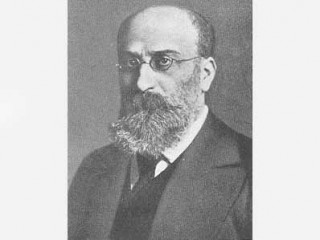
Guido Adler biography
Date of birth : 1855-11-01
Date of death : 1941-02-15
Birthplace : Moravia, Austria-Hungary
Nationality : Austrian
Category : Famous Figures
Last modified : 2010-06-21
Credited as : Musicologist and writer, studied at University of Vienna, Kurt Roger
0 votes so far
His father Joachim, a physician, died of typhoid fever in 1857. Joachim contracted the illness from a patient, and therefore told his wife Franciska to "never allow any of the children to become a doctor".
After studying music theory and composition at the Vienna Conservatory, he studied music history at the University of Vienna under Eduard Hanslick (1825–1904), whom he succeeded as professor. He worked with Philipp Spitta (1841–94) and Friedrich Chrysander in founding musicology as an academic discipline. Among his distinguished students were Karl Geiringer (1899–1989), Knud Jeppesen (1892–1974), Anton Webern, and Egon Wellesz (1885–1974).
In 1883 Adler became lecturer in musicology at University of Vienna, on which occasion he wrote Eine Studie zur Geschichte der Harmonie (An Essay on the History of Harmony), published in the "Sitzungsberichte der Philosophisch-Historischen Klasse der Wiener Academie der Wissenschaften", 1881.
In 1884 he founded (with Friedrich Chrysander and Philipp Spitta) the Vierteljahresschrift für Musikwissenschaft (Musicology Quarterly). Adler provided the first article of the first issue, "Umfang, Methode und Ziel der Musikwissenschaft" ("The Scope, Method, and Aim of Musicology", 1885), which not only constitutes the first attempt at a comprehensive description of the study of music, but also famously divides the discipline into two subdisciplines, historische Musikwissenschaft (historical musicology) and systematische Musikwissenschaft ("systematic musicology"). In Adler's article, systematic musicology included Musikologie or vergleichende Musikwissenschaft (comparative musicology), which later became an independent discipline (cf. ethnomusicology). Although these subfields do not exactly line up with current practice, they are roughly maintained in modern European musicology and roughly correspond to the North American the division of musicology into music history (often called "musicology"), music theory, and ethnomusicology.
In 1885 he was called to the newly established German University of Prague, Bohemia, as ordinary professor of the history and theory of music, and in 1898, in the same capacity, to the University of Vienna, where he succeeded Eduard Hanslick. His students at the Musikwissenschaftliches Institut included Anton Webern.
In 1886 he published Die Wiederholung und Nachahmung in der Mehrstimmigkeit; in 1888, Ein Satz eines Unbekannten Beethovenischen Klavierkoncerts. In 1892-93 he edited a selection of musical compositions of the Emperors Ferdinand III, Leopold I, and Joseph I (two vols.). Between 1894 and 1938 he was editor of Denkmäler der Tonkunst für Österreich, a seminal publication in music history.
Adler was one of the founders of musicology as a discipline (Musikwissenschaft). He was also among the first scholars in music to recognize the relevance of sociocultural factors to music (Musiksoziologie), thereby providing a broader context for aesthetic criticism which, with biography, had been the primary focus of 19th century music scholarship. Empirical study was for him the most important part of the discipline. His own emphasis was on the music of Austria, specifically the music of the First Viennese School: Haydn, Mozart and their contemporaries.
















